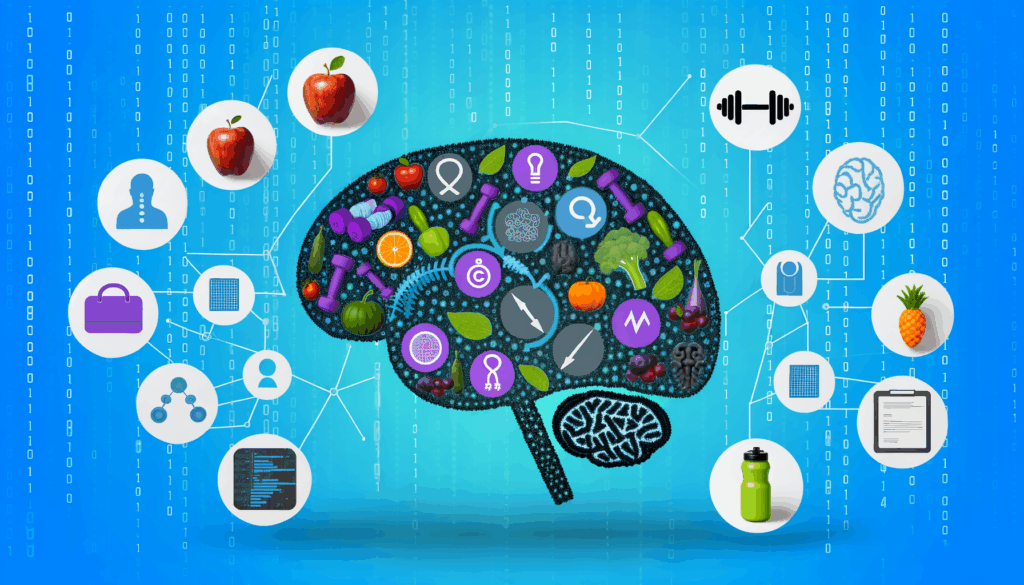The integration of brain-computer interfaces (BCIs) with nutritional optimization presents a novel frontier in enhancing cognitive performance. BCIs, which enable direct interaction between the brain and external devices, have the potential to revolutionize the way we approach neural enhancement and cognitive fueling. Nutritional strategies can play a crucial role in optimizing brain function, especially in the context of BCIs. This post explores how nutritional optimization, powered by tools like Calorie Calculator Cloud, can enhance the performance of individuals using BCIs, thereby improving overall cognitive function.
Nutritional Foundations for Brain-Computer Interfaces
BCIs operate by translating brain signals into commands for controlling devices such as prosthetic limbs or computers. For optimal BCI performance, users need to maintain peak cognitive function, which is heavily influenced by nutrition. Essential nutrients like omega-3 fatty acids, vitamin D, and complex carbohydrates support brain health by promoting neural communication and energy production. A well-balanced diet can be tailored using nutritional tools to ensure that BCI users are fueling their brains effectively for enhanced cognitive function.
Role of Nutrition in Cognitive Enhancement
Research indicates that specific dietary components can enhance cognitive abilities, including memory, attention, and processing speed. For instance, omega-3 fatty acids, found in foods like salmon, support neuronal structure and function. Similarly, curcumin, a compound in turmeric, has neuroprotective properties that may aid in the prevention of neurodegenerative diseases. By optimizing dietary intake, individuals can potentially improve their cognitive baseline, leading to better BCI performance.
Cognitive fueling strategies involve personalized nutritional plans that cater to an individual’s metabolic needs, lifestyle, and health goals. This approach can be particularly beneficial for BCI users who require consistent mental acuity. By using platforms like Calorie Calculator Cloud, individuals can create customized meal plans that support their cognitive demands while interacting with BCI systems.
Optimizing BCI Performance through Nutrition
Optimizing BCI performance involves not only technological advancements but also biological enhancements. Nutritional strategies can improve brain signal clarity and stability, reducing the noise and variability that can hinder BCI accuracy. For example, vitamin B6, folic acid, and vitamin B12 are essential for neurotransmitter synthesis, which directly affects neural communication. Proper levels of these vitamins can be maintained through a balanced diet or supplements like Garden of Life products.
Case Studies and Real-World Applications
Several studies demonstrate how nutritional interventions can enhance cognitive function in individuals using BCIs. For instance, a diet rich in antioxidants (e.g., from blue zones) can protect neurons from oxidative stress, potentially improving neural adaptability and signal transmission. Moreover, Nestle Health Science offers specialized nutritional solutions designed to support cognitive health, which could be particularly beneficial for BCI users.
In real-world scenarios, BCI users might use nutritional optimization to enhance their focus and endurance during extended BCI sessions. By ensuring adequate intake of complex carbohydrates and healthy fats, individuals can maintain sustained energy levels and support cognitive processing. This approach can be combined with technological optimizations, such as those explored by the UW BioRobotics Laboratory, to enhance overall BCI performance.
Integrating Nutrition with Emerging BCI Technologies
The future of BCIs involves integration with emerging technologies such as artificial intelligence (AI) and machine learning (ML). These integrations can lead to more personalized and adaptive BCI systems that learn from user behavior and physiological responses. Nutritional data can be incorporated into these systems to provide holistic feedback on how diet affects cognitive performance and BCI interaction.
Future Directions
As BCI technology advances, there will be a growing need for integrated approaches that combine nutritional science with cognitive enhancement strategies. Platforms like Calorie Calculator Cloud can play a pivotal role in this integration by offering customized nutritional advice tailored to the needs of BCI users. Furthermore, collaborations between nutritionists, neuroscientists, and AI experts will be crucial in developing a comprehensive understanding of how nutrition influences BCI performance.
Conclusion
In conclusion, the optimization of nutrition for BCI users presents a promising avenue for enhancing cognitive performance. By leveraging nutritional strategies and integrating them with technological advancements, individuals can unlock the full potential of BCIs. Whether through personalized diet plans or cognitive fueling strategies, optimizing nutrition can improve brain function, leading to more efficient and effective BCI interactions. For those interested in exploring these possibilities further, tools like Calorie Calculator Cloud can provide a valuable starting point. As the field continues to evolve, embracing an integrated approach to nutrition and technology will be essential for maximizing the benefits of brain-computer interfaces.








